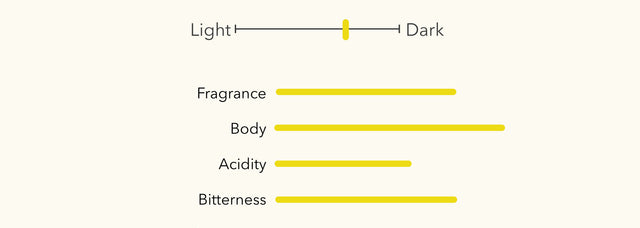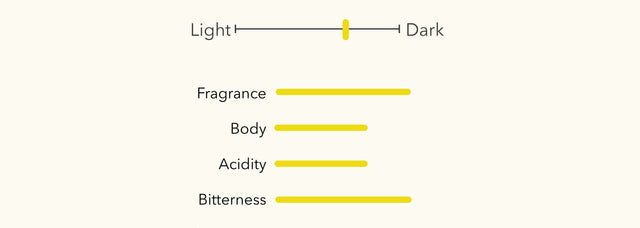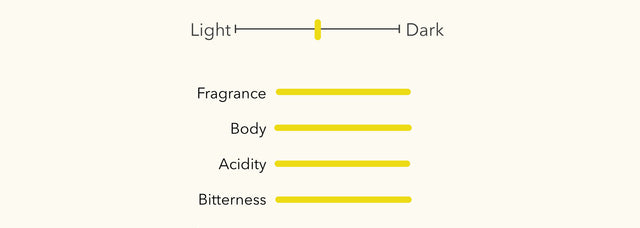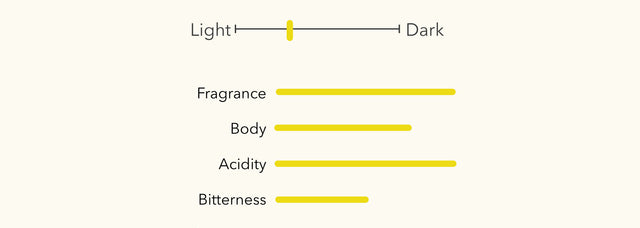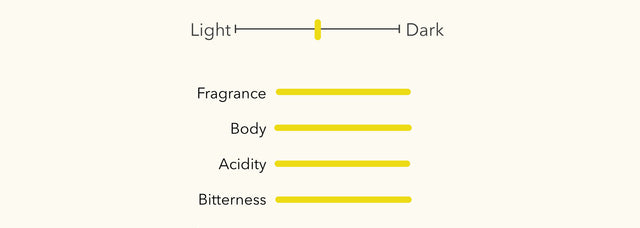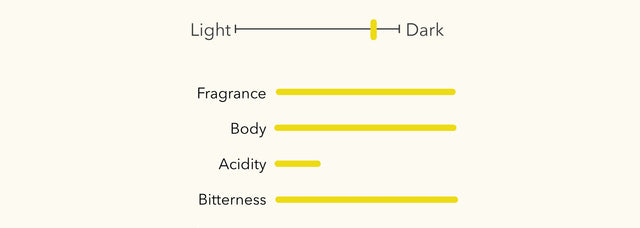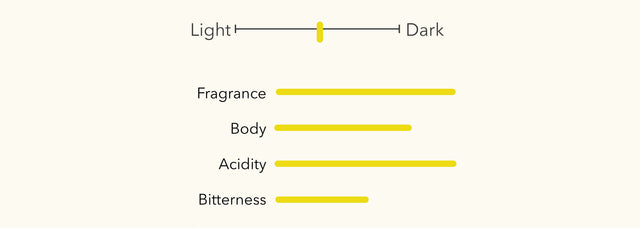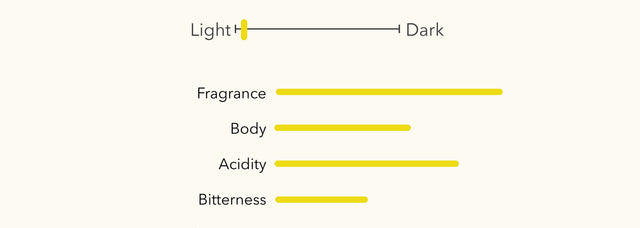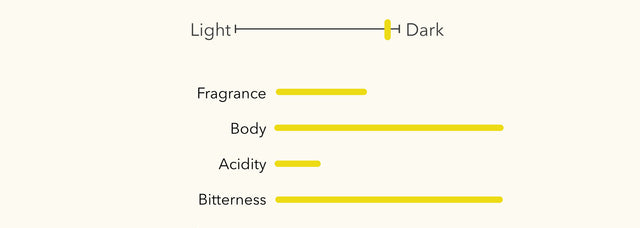"Hokkaido" – Japan's northernmost prefecture known for its abundance of nature, beautiful water bodies, fresh air, mountain ranges, and active volcanoes.
Throughout the year, the humidity is low and the temperatures are lower than in the rest of the country. This land, with an optimal environment for coffee brewing, was the place where Sapporo Coffee Kan was born in the year 1982.
The founding policy behind Sapporo Coffee Kan was our single-minded desire to give as many people as possible, the experience of having a truly delicious cup of coffee.

- Our commitment to Charcoal roasting
- All you need to know about the roasting mastermind behind our Japanese premium coffee – Sapporo Coffee Kan
- Overview of Sapporo Coffee Kan as a leading Japanese specialty coffee company
- The history of Sapporo Coffee Kan – from a small bean shop to an international coffee company
- Sapporo Coffee Kan, company profile and history at a glance
- Sapporo Coffee Kan’s core values and principles
- Why is Sapporo Coffee Kan’s coffee so special?
- Sapporo Coffee Kan Original sweets
- Where can you enjoy their coffee? - Sapporo Coffee Kan’s café and bean shop outlets
- Sapporo Coffee Kan moves to a new location – their headquarters, roasting plant, and a new café in one historical building surrounded by greenery!
- Sapporo Coffee Kan gets a brand new Sumiyaki Coffee Roaster!
Since the establishment of this company, the founder Eiichi Ito has placed great significance on the appreciation of the unique individuality of coffee beans that came from different countries rather than the fact that all the coffee beans were of top quality. Even today, we stay true to this commitment and apply this principle to the fine selection of our coffees' varieties and grades.
To bring out the best of the individual varieties, we roast them using our original roasting technique, the CSR (Charcoal Straight Roasting) method. In this way, Sapporo Coffee Kan has become Hokkaido’s pioneer charcoal coffee roaster.
After the roaster was well-established, Sapporo Coffee Kan’s first coffee shop was opened in 1986, in Sapporo’s Nishi-ku (west ward), with the desire to bring the joy of specialty coffee to a large number of people.
The founder's vision was becoming actualized in the form of a cup of coffee, along with the atmosphere, music, ambiance, and every little detail of the shop adding value to the experience of enjoying a truly delicious cup of coffee.
Within no time, Sapporo Coffee Kan earned the number 1 spot on the list of "5 best cafes with a constant flow of customers", which was ranked by the public listeners of a local radio program.
Afterward, the second generation President of Sapporo Coffee Kan, Mr. Ito traveled around the world in the pursuit of unique coffee beans that would be used exclusively at Sapporo Coffee Kan. In 2003, he came across San Conrad farm, located in Brazil’s Cerrado area, owned by Mr. Aguinaldo Jose De Lima, and established the first exclusive contract farm agreement with them. The vision of using exclusive coffee beans was actualized by finding a partner that could be fully trusted to provide a stable supply of coffee beans with the taste and quality that Sapporo Coffee-kan required. (Click here to see this exclusive contract farm coffee from Cerrado Shimada Plantation, Brazil)

In 2008, we have signed another exclusive contract farm agreement with Tabih village, a coffee farming village near Mount Batur, located in the northern region of Bali, Indonesia. (Click here to see this exclusive contract farm coffee from Mount Batur, Indonesia)
In 2011, a contractual agreement was made also for Mandheling coffee beans, the most popular coffee bean from Sumatra, Indonesia. (Click here to see this exclusive contract farm coffee from Mandheling, Indonesia)
We believe that the passion of the coffee producers and the passion of our company will come together to create the perfect cup of coffee, and help us to flourish and grow further in the future.
We send out world-class, delicious coffee beans from the heart of Hokkaido. Sapporo Coffee Kan will continue to work hard with dedication and commitment on our mission: to bring you the perfect cup of coffee.

Our commitment to Charcoal roasting
Specialty coffee roaster Sapporo Coffee Kan was Hokkaido's pioneer in charcoal coffee roasting and was the one to establish the original CSR (Charcoal Straight Roasting) method. Hokkaido is abundantly blessed with the gifts of nature, has high-quality air and water, along with a cool, non-humid climate that is highly favorable for roasting and brewing excellent quality coffee.
Having said that, it might be very common to have this misconception of charcoal grilled coffee = black, bitter coffee. Isn’t that so?
In reality, the above misconception is as far as it can be from the truth. Let’s break it down and take a look at why charcoal roasting produces one of the most delicious roasting finishes:
- Compared to other fuels, charcoal has much lower water content and produces almost no water vapor during its combustion. This means that the heat transfer to the core of the beans is extremely efficient.
- When charcoal is burnt, Far Infrared rays are emitted. Due to this effect, the beans are baked uniformly throughout the core and the surface, without the risk of creating uneven burn spots on the beans.
- The charcoal ash produced during charcoal roasting is alkaline. This alkalinity seeps into the coffee beans and moderately neutralizes the acidity within the coffee, creating a finely balanced taste, rich aroma, and a full body in the resulting cup.
All you need to know about the roasting mastermind behind our Japanese premium coffee – Sapporo Coffee Kan
Here at Japanese Coffee Company, we offer a type of coffee that is extremely rare to find in the world and even in Japan – Sumiyaki charcoal roasted coffee. The apparent reason why this coffee is exceptional is because of the unique Japanese roasting method and the extraordinary quality of the green beans that are ethically sourced from the best coffee-growing regions of the world. However, there is another less-obvious reason these coffee beans are so unique, and it is based on ‘Who’ is producing these coffee beans. That ‘Who’ is Sapporo Coffee Kan (サッポロ珈琲館), a company steeped deep in Japanese nature, history, culture, and craftsmanship.
Here, you will get to know everything about Sapporo Coffee Kan, and I hope any questions you might have about them will be answered. Furthermore, I hope that getting to know the fascinating Japanese Sumiyaki coffee makers will add more depth and soul to your coffee experience next time you are brewing a fresh pot of Sumiyaki coffee.

Overview of Sapporo Coffee Kan as a leading Japanese specialty coffee company
Sapporo coffee Kan originates in Hokkaido, "Hokkaido" – Japan's northernmost prefecture, known for its abundance of nature, beautiful water bodies, fresh air, mountain ranges, and active volcanoes. In Hokkaido, the humidity is low throughout the year, and the temperatures are lower than in the rest of the country. With an optimal environment for coffee brewing, this land was the place where Sapporo Coffee Kan was born in the year 1982.
The founding policy behind Sapporo Coffee Kan was our single-minded desire to give as many people as possible the experience of having a truly delicious cup of coffee.
Since the establishment of this company, the founder Eiichi Ito has placed great significance on the appreciation of the unique individuality of coffee beans that came from different countries rather than the fact that all the coffee beans were of top quality. The second president, Jin Ito, traveled worldwide to find the best coffee beans. They captured exclusive rights with farms from three countries, including Indonesia, Brazil & Columbia. Even today, the company stays true to this commitment and applies this principle to the fine selection of their coffees' varieties and grades.

To bring out the best of the individual varieties, they roast each coffee using their original roasting technique, the CSR (Charcoal Straight Roasting) method. In this way, Sapporo Coffee Kan has become Hokkaido’s pioneer charcoal coffee roaster. Their Sumiyaki method also uses only the best charcoal available, known as Binchotan charcoal. It burns for long hours while being very clean & food-grade safe. The steady high heat combined with alkalized ashes helps to enhance the taste & aroma.
Today, Sapporo Coffee Kan is a prestigious coffee company with over 40 years of history & has 11 internationally renowned cafes in Hokkaido. People all over Japan & the world visit the cafes for a taste of their exceptional coffees. They are also one the most respected & sought-after Sumiyaki Coffee providers in Japan, and have been featured in many Japanese TV shows, travel guides & newspapers.
Last but not least, they are part of the top-tier coffee associations in Japan, known as AJCA & JCQA. The Japanese Coffee Quality Association has one of the most rigorous testing processes to assure that every coffee appraiser meets the standards of expert knowledge & appraisal skills for cultivating the best coffee quality available. In addition, many of Sapporo Coffee Kan's staff are coffee instructors at JCQA. These factors contribute to the exceptional quality & unique taste of Sapporo Coffee Kan's Sumiyaki Coffee.

The history of Sapporo Coffee Kan – from a small bean shop to an international coffee company
Sapporo Coffee Kan started its journey in March 1982 as a wholesale retailer of coffee and tea-related products in Sapporo city's Chuo (central) ward. By 1984, the business had already flourished, and they started full-scale production of charcoal roasted coffee by installing a 20-lb charcoal coffee roasting machine.
In 1990, Sapporo Coffee Kan started providing a service that was quite rare – delivering freshly roasted coffee beans to offices. This "Office Coffee Service," which is still going on strong after all these years, also provides coffee machines and coffee brewing equipment delivery to offices so that people can enjoy specialty coffee at their workplace.

In 1986, Sapporo Coffee Kan opened its first café in Sapporo's Nishi (west) ward with the interiors, welcoming hospitality, and an ambiance that matches the Japanese premium specialty coffee. The founder's vision was becoming actualized in the form of a cup of coffee, along with the atmosphere, music, ambiance, and every little detail of the shop adding value to the experience of enjoying a truly delicious cup of coffee.
Within no time, Sapporo Coffee Kan earned the number 1 spot on the list of "5 best cafes with a constant flow of customers", ranked by the public listeners of a local radio program. Since then, it has quickly become one of the most popular cafes in Sapporo city.
Since 2003, the second generation President of the company has been traveling worldwide to find the best coffee beans. This has led to Sapporo Coffee Kan signing various exclusive farm contracts with the best coffee-growing regions in the world: Brazil San Conrad Farm (2003), Tabih village of Mount Batur region in Bali (2008), and Mandheling Berkat Lintong in Indonesia (2011).
Today, Sapporo Coffee Kan has ten outlets in Japan, including one in Tokyo. People come from afar to taste their hand-brewed specialty coffee at their quaint coffee shops and buy the Sumiyaki charcoal coffee beans. It also ships coffee beans worldwide through Japanese Coffee Co.

Sapporo Coffee Kan, company profile and history at a glance
Company Profile
| Name of the Company |
Sapporo Coffee Kan (Sapporo Coffee Museum) Co., Ltd. Eiichi Ito |
| Head office location | 561-2 Bunkyodai Midoricho, Ebetsu City, Hokkaido Prefecture (The head office has recently moved to this location, and we will discuss this in more detail below) |
|
Date of establishment |
March 1982 |
| Board members |
|

History of the Company
|
March 1982 |
The company opened as a shop for the wholesale business of coffee, tea, and related materials in Chuo-ku of Sapporo City. |
|
February 1984 |
Due to the small size of the original warehouse, the head office was moved to a larger location in Nishi-Ku. This improved the performance of the business greatly. |
|
April 1984 |
A 20lb charcoal roasting machine was installed, and the full-scale operation of Sumiyaki charcoal coffee roasting began. |
|
April 1986 |
The brick warehouse and head office were partially remodeled, and the charcoal coffee roasting shop (Sapporo Coffee Kan) was opened as a PR shop. |
|
November 1986 |
The innovative products - Charcoal Coffee Yokan (Japanese sweets) and Café au lait Yokan saw huge popularity and sold in huge numbers as gift sets. |
|
April 1989 |
The business underwent a review and significant expansion. The wholesale coffee business and the café stores were separated so they could be managed better. |
|
May 1989 |
At the 21st Confectionary Expo, Café au lait Yokan (the company's original dessert) won a prestigious award. |
|
July 1989 |
The workshop was moved to a new location in Nishi-Ku, and a large compound was established that included the workshop, specialty store, café, roastery, culture room, and the head office. The building used for this establishment was a historical building from the early Showa-era, and it has been used previously as Hokkaido Industrial Research Institute. |
|
February 1990 |
The opening of the Sapporo Coffee Kan Tsukisamu branch. |
|
April 1990 |
The company started providing a new service called the 'Office Coffee System (OCS)," where companies and businesses could have freshly roasted Sumiyaki coffee beans delivered directly to their office buildings. |
|
1992 |
Introduction of a new product – Cappuccino Yokan |
|
May 1995 |
The opening of the Kitamaruyama branch, along with a cake factory. |
|
June 1995 |
Release of a new original drink – “Meisui Iced Coffee." This iced coffee was made using pure natural water sourced from the foot of Mount Yōtei, a stratovolcano in Shikotsu-Toya national park, Hokkaido. |
|
January 1998 |
Opening of the first coffee bean shop in Hachiken of Sapporo City. |
|
April 1998 |
Opening of the second coffee beans shop on the first floor of the Tsukisamu branch. |
|
September 2003 |
The first exclusive coffee farm contract was signed with a farm in the Cerrado region of Brazil. |
|
October 2004 |
Opening of Clock Tower Garden Terrace coffee shop. |
|
July 2005 |
The then ambassador of Uganda to Japan visited the Sapporo Coffee Kan company. A contract was signed that gave the company exclusive rights to roast “Uganda Elgon Mountain” specialty coffee beans. |
|
October 2005 |
Opening of Ōyachi branch. |
|
November 2006 |
Opening of Kotoni branch. |
|
July 2007 |
Signed an exclusive contract farm with the coffee growers of Tabih village in Bali, Indonesia. |
|
December 2007 |
Opening of Kitano branch which also included a cake factory. |
|
March 2009 |
A new product called Espresso Caramel was released. |
|
March 2009 |
An exclusive contract was signed with the coffee growers from Forjados Farm Patrocínio, Minas Gerais, Brazil. |
|
October 2009 |
Opening of Atsubetsu branch. |
|
November 2009 |
Sapporo Coffee Kan Tsukisamu branch won the “14th Sapporo City Landscaping Award." |
|
January 2010 |
All AIR DO (Hokkaido Airlines) flights started to offer Sapporo Coffee Kan's original blend for their in-flight coffee services. |
|
April 2010 |
Decaffeinated “Mocha Blend” coffee beans were released. These were processed using a new technique that helped to remove the caffeine but keep the original taste of the coffee. |
|
May 2010 |
All flights of AIR DO (Hokkaido airlines) started to sell Sapporo Coffee Kan coffee beans as part of the in-flight shopping experience. |
|
January 2011 |
An exclusive farm contract was signed with a farm in Lingtong, Mandheling, Indonesia. |
|
December 2011 |
Opening of Hiragishi branch. |
|
April 2012 |
A contract was signed with a company from Manizales, Colombia, called the LOLO coffee group to make “Lewis Mountain” coffee. |
|
September 2012 |
Release of a new product in the Hokkaido Sweets series – Sapporo Coffee Kan Café chocolate. |
|
December 2012 |
Release of a new product in the Hokkaido Sweets series – Sapporo Coffee Kan Café Latte chocolate. |
|
April 2013 |
An exclusive farm contract was signed with a farm from Huila, Colombia, to make 'Pital Mountain’ coffee. |
|
April 2022 |
To celebrate its 40th year since the company was founded, the head office was moved to Ebetsu city of Hokkaido. The new building, which also houses a café and a shop, is situated inside a historical building called the Hokkaido Forest Tree Breeding Center Building (a cultural property registered by the Agency for Cultural Affairs). |

Sapporo Coffee Kan’s core values and principles
The company’s core principle is to make specialty coffee available to as many people as possible. In the decades Sapporo Coffee Kan has been active, this founding policy has prevailed. As a regionally famous coffee roaster that supplies coffee in and out of Japan, it has certainly stayed true to and succeeded in its mission.
Besides this primary goal, Sapporo Coffee Kan is also guided by the following policies:
- Ensuring that the original qualities of the coffee are kept alive - The company holds the pursuit of the best-tasting single-origin coffee beans as a priority. These beans are taken to Japan, where they are roasted and brewed in such a manner that they retain their original flavor and aroma.
- To keep Japan's impressive artisan industry thriving, Sapporo Coffee Kan's artisan roasters' hands are responsible for turning those beans sourced from such places as Indonesia and Brazil into delightful roasts, using the traditional Japanese roasting technique using top-notch binchotan charcoal. These artisan roasters come up with sumiyaki coffee, considered a rare gem even in the specialty coffee scene.

Sapporo Coffee Kan’s slogan is “Have a Rich Time with the Best Coffee,” and the company makes this happen by being committed to the following factors:
- Careful selection of green coffee beans with just the taste customers want.
- Producing sumiyaki (charcoal-grilled) coffee from carefully-selected raw beans that get the direct-fire roasting from Binchotan charcoal.
If you’re wondering why sumiyaki coffee is exceptional, here are the reasons:
- Due to charcoal’s low water content, its combustion produces nearly no water vapor, making heat transfer better.
- A more even baking of the beans' core is achieved thanks to the far-infrared effect brought forth by burning charcoal.
- The alkalizing impact of charcoal ash has a moderately neutralizing effect on coffee’s acidity, resulting in the beans giving off a richer flavor and aroma.
- Managing the coffee beans' freshness to maintain their alkaline quality after roasting. It prevents or delays the natural oxidation that happens over time.
- In their cafes, extracting through the Nel drip method allows the original, more rounded taste of coffee to pass through better than the paper drip way does.
- Sapporo Coffee Kan has also played a vital role in spreading the coffee culture and coffee knowledge to the general public. Even as early as 1989, when the world had not yet fully become aware of the 'third-wave coffee boom,' it has opened a place to celebrate the culture and lifestyle related to coffee. A large site that used to be Hokkaido Industrial Research Institute during the Showa era was converted to a coffee hub consisting of a coffee beans shop, roasting room, café, culture room, distribution center, and office rooms. People could come here and immerse themselves in everything related to specialty coffee.

Why is Sapporo Coffee Kan’s coffee so special?
Coffee beans and roasting
Sapporo Coffee Kan's beans are carefully selected from the best regions of the world that have the optimum conditions in terms of nature and climate for growing delicious coffees, such as volcanic soil, high altitude, nutrient-rich soil, and abundant water supply. In addition, Sapporo Coffee Kan has exclusive contract farms (for example, the San Conrad farm in Brazil's Cerrado area), which ensures that the coffee beans are processed and treated best to retain the original characteristics of the beans.

To give you a quick idea of the quality of the beans used at Sapporo Coffee Kan, one of Sapporo Coffee kan’s coffee beans is ‘Bali Batur Mountain single-origin coffee.' This exceptional coffee results from an exclusive agreement made between Sapporo Coffee Kan and the Tabih village of Bali Batur Mountain. This village cultivates coffee beans using traditional and natural methods, free of synthetic chemicals, and 95% of the coffee produced by this village is G1 grade (the highest possible raw coffee beans standard)!
Once these coffee beans finally arrive at Sapporo Coffee Kan's roasteries, they are roasted meticulously at the hands of highly experienced artisan roasters using a rare roasting process exclusively developed by this company – The Sumiyaki charcoal roasting process. Instead of gas burners or direct heat from fuels, this roasting process uses Binchotan charcoal to roast the raw coffee beans. Binchotan charcoal is considered the best charcoal in the world, and it releases a large quantity of Infrared and Far-Infrared rays. These rays reach the beans' core, heating it from the inside slowly, allowing them to have a plump finish when the roasting is complete. In addition, it preserves the innate characteristics of the coffee beans so all the flavor, taste, and aroma can be enjoyed to their full potential in the final cup of coffee.
Below are some of the best-selling coffee beans from Sapporo Coffee Kan, their origins, and roast types.


Brewing method
Once the coffee beans are roasted to perfection, they are brewed to release the best flavor and taste at the hands of a pour-over artist called 'master' instead of a barista. This person, who has years of experience, passion, and dedication to brewing coffee, uses a unique brewing method called ‘Nel drip’ to make you a delicious cup of coffee with deep and rich flavors. These flavors include the pleasant smokiness of charcoal roasting and the original characteristics of the coffee beans, such as citrus, floral, fruity, and chocolaty notes.
Here is a little video you can enjoy to learn more about how they select their beans to how they roast them using the Sumiyaki method:
Sapporo Coffee Kan’s unique products that sparked the interest of coffee lovers in Japan
Sapporo Coffee Kan is a master of upholding the beauty of Japanese resources and traditions in their unique products.
Sapporo Coffee Kan Premium Decaf Coffee
One such example is their premium Decaf coffee.
Sapporo Coffee Kan has been particularly vigilant and active in making high-quality decaf coffee products even before the general public, and the big manufacturers in Japan caught up with the decaf coffee boom. Sapporo Coffee Kan has been crafting and selling coffee from which more than 93% of the caffeine has been removed since 2009.

Japanese News Article Featuring Jin Ito, Sapporo Coffee Kan About Premium Decaf Coffee (Click here to download the article)
Sapporo Coffee Kan’s President Hitoshi Ito has been dedicated to making decaf coffee that retains the original qualities of the coffee beans, and his single-minded dedication has created a premium quality decaf coffee that has the richness of taste, aroma, and flavor that is rare to find in usual decaf coffees.
Usually, the desirable qualities of coffee tend to be removed along with the caffeine during the decaffeination process. This is why President Ito of Sapporo Coffee Kan has searched far and wide to find a decaffeination process that keeps the originality of the coffee beans intact. He has finally found it in the coffee beans that he imports from Germany, which have been decaffeinated using a rare and unique German decaffeination process.
He has been wanting to make delicious specialty coffee accessible to everyone – including coffee lovers who cannot consume caffeine, such as pregnant or breastfeeding mothers, people with insomnia, or people who are caffeine-intolerant. Sapporo Coffee Kan has also been supplying this decaf blend to other cafes in Japan, where this decaf coffee has been used to make beverages and desserts (even tiramisu!) for years.
Some of the reviews from the loyal fan base of this coffee include, "I would not have guessed this is decaf!" Also, "I can enjoy this coffee without having to worry about the caffeine affecting my baby." Sapporo coffee Kan's Decaf coffee is so popular that it frequently appears in Hokkaido Shimbun, the biggest daily newspaper in the northern region of Japan.

Sapporo Coffee Kan Original sweets
Another example is their Sumiyaki coffee-based sweet delicacies. In 1986, they released their first charcoal-roasted coffee-flavored Yokan sweets. Yokan is a traditional Japanese sweet made with agar jelly, and it usually has more Japanese flavors, such as Azuki beans and Matcha green tea. But Sapporo Coffee Kan took the brave challenge to make it in non-traditional flavors such as charcoal coffee, café au lait, and cappuccino, enabling people to taste something different than the usual.
Sapporo Coffee Kan did not stop its innovative sweet products with coffee-Yokan. They also make delicious confections such as espresso-flavored caramels and their Sapporo Coffee Kan original coffee chocolate and café latte chocolate bars. These products make a great ‘Omiyage’ (Local specialty gifts you bring to your friends and family from a trip to a specific location) from Hokkaido, Japan’s northern region.


Where can you enjoy their coffee? - Sapporo Coffee Kan’s café and bean shop outlets
Sapporo coffee Kan has several outlets, most of them in Hokkaido and one in Tokyo. At the time of writing this article, they have 11 outlets in total! Their café stores reflect the Japanese hospitality and café culture, which has a level of attention to detail that is difficult to come across anywhere else. At the heart of how they choose their café locations and design the stores is to make the customers say, "I wouldn't have imagined finding a coffee experience of this level in a place like this!" This means you can find their outlets in the middle of a busy city center or just around the corner of a quiet street, in a subtle way, just like a little gem hidden away from all the hustle and bustle.
Another great thing about the cafes of Sapporo Coffee Kan is that they are often built using refurbished historical buildings. For example, the main branch is housed inside a salon-style building from the Showa era that used to be Hokkaido Industrial Research Institute. Another outlet uses a stone building from 1945 that used to be a fruit sorting place.
The café space is created so that once you are inside the café, you can take a deep breath, loosen your shoulders, sit back at a cozy seat and truly relax while the 'master' carefully brews your coffee using Nel drip. It is a no-rush business, and the slow brewing time allows you to take a moment to appreciate all the goodness of the store – the smell of roasting coffee beans, the decadent lighting, the welcoming smile of the staff, the tasteful music playing at just the right volume. The fact that the coffee comes in a pot shows that it is a place where you take your time to relax and enjoy your coffee slowly, not in a grab-and-go style.
The café interior uses warm lighting, long counter tables, dark wooden furniture, and a modern-retro style. You will be surprised to know that they have separate serving cups, lighting, and music for daytime and evening time to make the atmosphere a perfect match for the guest's moods during different times of the day.

Sapporo Coffee Kan moves to a new location – their headquarters, roasting plant, and a new café in one historical building surrounded by greenery!
2022 May, Sapporo Coffee Kan had an exciting announcement – they have moved their head office and roastery, along with a café space, to a new location – Ebetsu City. They moved to a new place to celebrate their 40 years of establishment. Their head office has been in Nishi-ku of Sapporo city since 1989. After 33 years, they are renewing their head office location, so we can expect it to be quite exciting.

The building that has been used for the new location is an old government building for Hokkaido Regional Forest Tree Building Centre, originally built in 1945, and reflects the rich history of the era. It is made in a construction style called 'Half-timber,' where wood is combined with other materials such as stones. As you walk up to the building, you will be welcomed with a picturesque façade with white and magenta windows that are well-proportioned and neatly organized.

Once you enter the building, you are surrounded by the aroma of the coffee, a spacious café area lit by natural light coming through the windows, and warm lights from the ceiling. Paying homage to the history of the building (it was the regional forest breeding center), the focus of the interior decoration is 'wood.' The furniture, window frames, doors, and wainscots are all made of high-quality wood that makes you feel at home and calm down to your soul. It reminds us of the beauty of wood and timber and inspires us to care for the nature that gives us this building material.
Once you settle down in a comfortable seat, you can enjoy a cup of delicious Sumiyaki (charcoal roasted) coffee, maybe with one of their exquisite desserts on the side (their recommendation for June is “Yomogi Chiffon Cake," yomogi is a Japanese plant leaf that is used to make traditional Japanese desserts.)
After your coffee, you might want to buy a little gift for your friends and family, as the café has a shop corner where you can buy their original pre-made coffee drinks, beans, sweets, and other merchandise.
|
Address |
561-2, Bunkyodai, Midori Machi, Ebetsu City |
|
Business Hours |
9:30 – 18:00 (Closed every Monday) |
|
Number of seats |
36 seats inside the store |
|
Parking |
11 units |

Sapporo Coffee Kan gets a brand new Sumiyaki Coffee Roaster!
As we have mentioned in the last section, Sapporo Coffee Kan’s headquarters and the roasting factory have moved to a new, bigger location. As a celebration of this exciting relocation, they have equipped their factory with a brand new custom-built ‘Direct fire charcoal coffee roasting machine.’
This machine has the capacity to roast an astounding 30kg of coffee beans at a time. It is also geared with a special mechanism that eliminates excess smoke and unpleasant odor using an afterburner. Putting special thought into the design of the roaster, Sapporo Coffee Kan has chosen a gorgeous Italian red for its new roasting machine – the color is bold, bright, and suits the new location perfectly.
When you order coffee beans from Sapporo Coffee Kan, which can be done from anywhere in the world, this is how the beans are freshly roasted using the charcoal coffee roasting machine:
- Green coffee beans that have been carefully selected from the best coffee-growing regions of the world are carried to the top of the roasting machine by a conveyor belt.
- At the top of the roasting machine, a metal filter removes impurities and any unwanted materials from the beans and makes sure that only the coffee beans are entering the machine.
- The beans enter the rotating drum of the roasting chamber from the hopper.
- Far Infrared rays from the burning charcoal (Sumiyaki roasting) come from the bottom part of the machine and roast the beans from their core. When the beans are heated up from the core, the maximum level of original flavor and taste of the beans are preserved.
- When the beans have been roasted to the desired level, they are cooled down on the rotating turntable part of the machine.
- Once the beans have cooled down, a mechanism called ‘Air-shooter’ lifts up the beans to the top part of the machine. At this point, the force of the air shooter removes impurities and unwanted materials from the roasted beans.
- After the roasting process, the beans are carefully checked by artisan roasters, and only the batches that pass a strict quality test are sent to the factory for packaging.
You can watch Sapporo Coffee Kan’s new Sumiyaki roaster in action below.
Conclusion
Sapporo Coffee Kan is an excellent example of a company that is not afraid to venture out into the new, reaching out to coffee lovers all over the world while respecting the Japanese traditions, culture, and resources. I would recommend anyone who has the chance to try out their coffee and to visit one of their café outlets.
Read more about Sumiyaki Charcoal Roasting
Get Free Bonus Books

Sign up for free to the Japanese Coffee Club to get advice and exclusive articles about how to choose Japanese Coffee, and tips, tricks, and recipes for enjoying Japanese coffee.

